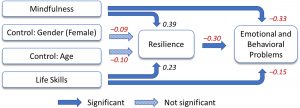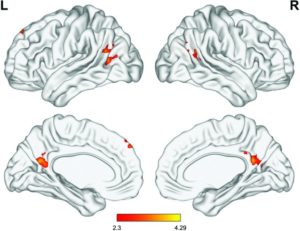Spirituality is Associated with Greater Resilience in College Students
By John M. de Castro, Ph.D.
“for many people, religion, personal beliefs and spirituality are a source of comfort, wellbeing, security, meaning, sense of belonging, purpose and strength.” – World Health Organization
Spirituality is defined as “one’s personal affirmation of and relationship to a higher power or to the sacred. There have been a number of studies of the influence of spirituality on the physical and psychological well-being of practitioners mostly showing positive benefits, with spirituality encouraging personal growth and mental health.
Stress is ubiquitous in people’s lives and it can interfere with the individual’s ability to achieve their goals and maintain psychological well-being. When highly stressed, resilience is required to cope with the stress and prevent its negative impact on psychological well-being. It would seem likely that since both spirituality and resilience are related to psychological well-being that they would be related to each other.
In today’s Research News article “Relationship between aggression and individual resilience with the mediating role of spirituality in academic students – A path analysis.” (See summary below or view the full text of the study at: https://www.ncbi.nlm.nih.gov/pmc/articles/PMC7032025/), Sadeghifard and colleagues recruited university students and had them complete measures of spirituality, aggression, and resilience. They then analyzed the relationships between these variables with structural equation modelling.
They found that the higher the levels of spirituality the higher the levels of resilience. While the higher the levels of resilience the lower the levels of aggression. They also found that spirituality was related to resilience both directly and indirectly. Structural equation modelling revealed that spirituality was directly related to higher levels of resilience and also indirectly by being related to lower levels of aggression which was, in turn, was related to higher resilience.
The study was correlational. So, causation cannot be determined. Nevertheless, the ability to effectively cope with stress and life’s difficulties, resilience, is an important part of maintaining psychological well-being and resilience appears to be impaired by aggression. Spirituality is known to contribute to psychological well-being and it is related to both lower levels of aggression and higher levels of resilience. It can be speculated that the relationship of spirituality to mental health results from its negative relationship with aggression and its positive relationship with resilience.
So, spirituality may make college students more resilient and thereby improve their psychological well-being.
“for many people, religion, personal beliefs and spirituality are a source of comfort, wellbeing, security, meaning, sense of belonging, purpose and strength.” – Olivia Goldhill
CMCS – Center for Mindfulness and Contemplative Studies
This and other Contemplative Studies posts are also available on Google+ https://plus.google.com/106784388191201299496/posts and on Twitter @MindfulResearch
Study Summary
Sadeghifard, Y. Z., Veisani, Y., Mohamadian, F., Azizifar, A., Naghipour, S., & Aibod, S. (2020). Relationship between aggression and individual resilience with the mediating role of spirituality in academic students – A path analysis. Journal of education and health promotion, 9, 2. https://doi.org/10.4103/jehp.jehp_324_19
Abstract
BACKGROUND:
The importance of spirituality and spiritual growth in humans has been increasingly taken to attention by psychologists and mental health professionals. In this study, we aimed to investigate the relationship between the tendency to aggression and individual resilience also considering the role of mediator of spirituality in academic students by path analysis.
MATERIALS AND METHODS:
A cross-sectional study was conducted using structural equation method (SEM). The target population consisted all of undergraduate academic students in Ilam, Iran University of Applied Sciences, in 2018. Participants included 200 people whom were selected by stratified random sampling. Data collection tools were demographic, Buss and Perry aggression, spirituality assessment, and resiliency of Connor and Davidson questionnaire. In this study, bivariate analysis was used to determine the directionality correlation between the study variables.
RESULTS:
The results showed that there was a significant and positive correlation between spirituality and resilience (r = 154% r = 83%). Furthermore, there was a negative and nonsignificant relationship between aggression with resiliency (r = −122% P = 101). In addition, there was no significant correlation between the aggression and spirituality (r = 0.05%, P = 0.942). The results of SEM showed that spirituality and aggression can predict about 20% of the variations in the degree of resilience in academic students. Accordingly, the results of SEM spirituality in an indirect path reduce the aggression and thus increase the resilience (r = 0.102).
CONCLUSION:
The results of this study showed the effect of spirituality on increasing the level of resilience and also positive mediator role of spirituality between aggression and resiliency.









